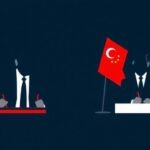Repatriation of Batswana of Namibian Descent: A Step Towards Healing Historical Wounds
Recently, 85 individuals of Batswana descent were welcomed back to Namibia after a decade of negotiations. The Namibian government has committed to assisting these returnees in reintegrating into society by providing temporary shelter and basic necessities while facilitating their access to essential services such as education and pension arrangements. This event has opened discussions on historical reparations related to colonial injustices.
The Namibian government officially welcomed 85 individuals of Batswana descent, repatriating them to their homeland at the /Gam area within the Otjozondjupa region. Following a decade of discussions, Cabinet has mandated a collaborative effort by the ministries of land reform, immigration, and international relations and cooperation to facilitate the return of these individuals who have been historically tied to Namibia. Calle Schlettwein, the Minister of Land Reform, announced that his ministry will oversee the initial support for the repatriates, which will include provisions for their basic needs over the next three months. The focus of this initiative is to reintegrate the returnees into society effectively. Registration for schooling for children and pension arrangements for elders has already been completed to expedite their transition. Minister Schlettwein emphasized, “We will look after them for three months, and then we will see where there is land to resettle them, and where we can help.” In addition, Petrus Nangolo, the Deputy Executive Director, remarked on the importance of easing the reintegration process, having provided the returning families with essential food supplies and temporary accommodation in tents until they are settled into permanent housing. Immigration Minister Albert Kawana highlighted the historical bond between the Namibians and Batswana, stating, “Namibia will ensure those who are repatriated are provided national documents such as IDs and passports for easy mobility within and beyond Namibia.” He also affirmed that necessary exemptions on customs duties would apply to their belongings and pledged that all essential support measures would be uniformly enforced for the returnees. The repatriates expressed their elation regarding their return to Namibia, with Kavetjimo Tjavanga, a 60-year-old returnee, sharing, “It was a long process; some people even died while waiting to be repatriated. Namibia is our country, and our grandparents were forced to flee to Botswana by the brutal colonial regime.” Similarly, 70-year-old Katjirari Mutenge reflected on the long wait, acknowledging the loss of individuals who had hoped to return before them. Chief Eben Tjozohongo II Nguvauva of the Ovambanderu Traditional Authority recognized this event as a significant milestone in historical remembrance, linking the repatriation effort to discussions on the German colonial genocide. He stated, “This is a good testimony to the world. History repeated itself, and it was joyous to see the returnees touching the ground of their ancestral land.” In summary, the return of the Batswana of Namibian descent has not only facilitated their reunion with their homeland but has also reignited discussions on reparations related to historical injustices faced by their ancestors. The support provided by the Namibian government will be crucial in ensuring a smooth reintegration process for these individuals as they reestablish their lives in Namibia.
The repatriation of Batswana of Namibian descent to Namibia marks a significant moment in the country’s history, reflecting both social reconciliation and a response to historical grievances. Following colonial displacement, many Namibians sought refuge in Botswana. The recent facilitated return of these citizens has been a product of dedicated efforts by various government ministries, aimed at addressing the protracted socio-political consequences of historical dislocation and loss of land. The process has transpired amidst a backdrop of increased focus on restitution for affected communities tied to historical injustices, particularly concerning the legacy of German colonialism.
In conclusion, the repatriation of the Batswana of Namibian descent represents a critical step towards healing historical wounds and facilitating social reintegration into the Namibian community. The government’s comprehensive support strategy underscores its commitment to restorative justice and sets a precedent regarding the treatment of repatriates. Ultimately, this development not only signifies a reunion with one’s homeland but also serves as a poignant reminder of the ongoing discussions surrounding historical reparations and the enduring impact of colonialism.
Original Source: neweralive.na







Post Comment